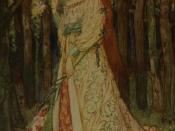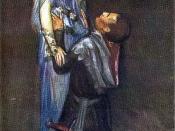One of the more common themes in Literature throughout the ages is love. A strong feeling of attachment to another, experienced by everyone of us some point in our lives. Love can mean different things for different people- sorrow, anger, joy, happiness or betrayal. Although love has been associated positively most of the time, it may sometimes be less optimistic such as in Sonnet 130 where the writer criticises society upon its views regarding perfection of women and the poem Villegiature where the speaker feels that the love that he had, had vanish and no longer feels committed to her lover. Other poems such as When We Two Parted, the speaker conveys his sentiments of great sadness that befell him when his lover left him. "Half broken-hearted to sever for years..." Writers convey their perception of love in each individual way.
While Shakespeare adopts a Shakespearean form of writing, E.Nesbit conveys his attitude to love through the Petrachan form.
Whilst E.Nesbit is writing about a lady living in her fantasy, Shakespeare's is more of the contrary. In his poem, the speaker describes the perfect woman; although his preferences were highly unconventional during that period of time. "My mistresses eye are nothing like the sun...black wires grow on her head." The speaker went against the conventional expectations that the ideal woman should embody qualities such as "red lips" and "sweet breath." Besides clearly expressing his feelings towards love, Shakespeare attempts to criticise the general assumption about woman at that time. More than once he mocks the fundamental basis of poetry regarding love as he felt that there was no need to stretch the fact that beauty does not depend upon eyes of starlight or lips of coral but simply beautiful eyes or lips. This satirical effect mocks the physical impossibilities that...


![Sydney, en villégiature / [Sydney], vacationing](https://s.writework.com/uploads/6/67142/sydney-villegiature-sydney-vacationing-thumb.jpg)